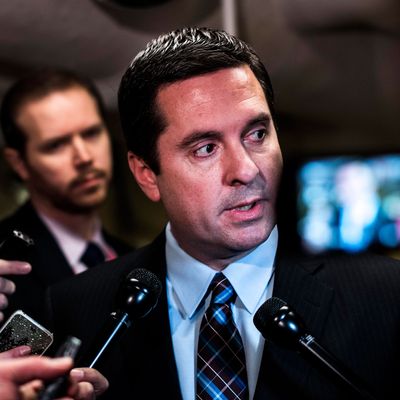
Most weeks, New York Magazine writer-at-large Frank Rich speaks with contributor Alex Carp about the biggest stories in politics and culture. Today: snags in the House’s Russia investigation, the GOP’s health-care fail, and George W. Bush’s artistic endeavors.
With a hastily postponed public hearing, a mysterious trip to the White House “grounds,” and widespread suspicion that he is coordinating with the Trump administration, Devin Nunes has effectively brought the House Russia investigation to a screeching halt. Is the Russia probe too big for Congress?
Let’s start by stipulating that anything is too big for this Congress, whose Republican majority could not move a health-care bill that it claimed to have been working on for seven years. But even by that standard, Nunes is either exceptionally stupid, incompetent, duplicitous, or perhaps all three. With his bizarre nocturnal I Spy antics, his nakedly partisan attempts to vindicate Trump’s invented claims of Obama wiretapping, and his cancellation of yesterday’s hearing (where the witnesses would have been the fired acting attorney general Sally Yates as well as Obama’s heads of National Intelligence and the CIA), he has in essence ended the House investigation into the Trump-Russia connection. And despite all the moaning about it by editorialists as well as by both Democratic and Republican lawmakers, over the long term this may be a good thing.
Nunes was a member of the Trump transition team. The more he thrashes around and tries to carry off these ludicrous stunts to protect his president — and please do keep on keeping on — the more he reveals the desperation of a White House that has much to hide. Though Nunes’s intention apparently is to abet the White House cover-up, he is instead shining a harsh spotlight on it with almost every move he makes. Meanwhile, two other investigations into Russia-Trump election-year collusion remain on track: by the FBI and by the Senate Intelligence Committee, which so far shows every sign of holding to the bipartisan standard shredded in the House.
Better still, the delegitimizing of Nunes’s investigation has ended its potential value as a safe haven for suspects looking for a spin zone. Let’s not forget that just before Nunes’s recent calamities Paul Manafort had volunteered to meet with his committee — a meeting that would be conducted on Manafort’s own terms (e.g., likely in private and not under oath) and that was clearly concocted to create the public impression he was a cooperative witness with nothing to hide. Should the Manafort appearance go forward now that Nunes has blown up the committee, it will have zero credibility. Had Nunes been clever enough to conceal his partisanship, Manafort might have gotten away with his little game.
Meanwhile, the Senate Intelligence Committee moves forward, preparing for a session with Jared Kushner and instructing Roger Stone to preserve documents of his Russian dealings. Nunes has unwittingly boosted that investigation’s clout by destroying the standing of his own.
During the run-up to the health-care non-vote last week, you wrote that “if ‘repeal and replace’ dies after seven years of relentless GOP promises … so does the credibility of the president and the congressional leadership.” Is the rest of the Trump agenda doomed?
Trump remains the president, and he can inflict a lot of damage with his steady parade of executive orders, whether on immigration or environmental deregulation. But he can’t deliver on his big promises, from repealing Obamacare to tax cuts, without Congress. Trump doesn’t know how a bill becomes law. Paul Ryan has little history as a successful legislator. (Writing in the Times, Corey Robin pointed out that only three bills Ryan has sponsored since arriving in the House in 1999 have made it to a president’s desk.) Last week’s health-care flameout notwithstanding, a key Ryan deputy, the House Majority Whip Steve Scalise, has now declared that “we’re closer today to repealing Obamacare than we’ve ever been before.” Whatever. It’s clear that the anti-government party doesn’t know how to govern even when it is holding all the cards. If anything, the Putin style of governance is a much closer ideological fit for the current GOP than constitutional democracy.
Wishful thinking among Republicans that this chaos will somehow self-correct is to some extent based on the notion that people change: The 70-year-old Trump will suddenly start learning from his mistakes. (Never mind that he doesn’t even know he makes mistakes.) Ryan will reveal his heretofore secret gifts for forging deals across the aisle in the legendary manner of the Democratic speaker Tip O’Neill. The Freedom Caucus will splinter. But as Democratic spines stiffen, Trump’s poll numbers continue to plummet, and the White House’s palace intrigues and blame-shifting ratchet up further, the best the party in power may be able to achieve is triage, not consequential legislation. With both a new spending bill and a raising of the debt limit on the upcoming congressional docket, a government shutdown is more likely than, say, the consummation of tax reform, the building of a border wall, or the mounting of a massive infrastructure program.

Reviewers of George W. Bush’s new book of paintings, full of portraits of wounded veterans of the wars in Iraq and Afghanistan, seem baffled by both the quality of his work and the innocence of his atonement. Are we witnessing a W redemption tour?
Whether that is Bush’s intent or not, the release of his book, a best seller, is playing that way in some quarters. Even I, who wrote a book about Bush’s duplicity in selling the Iraq war, was charmed by his self-effacing appearance with Jimmy Kimmel; he was out-and-out funny in dodging any direct statements about Donald Trump. Reading the Texas writer Mimi Swartz’s Times op-ed piece about how ardently the former president pursued his late-in-life artistic calling during his Dallas retirement leaves little doubt that his passion for painting is both sincere and searching.
But none of this rewrites history. Bush is not atoning for the epic fiasco that maimed the subjects of his paintings and killed so many more whose portraits cannot be painted. Nor has he or anyone else in the Bush family taken responsibility for their role in pandering to the far-right forces that have culminated in Trump, from George H. W. Bush’s exploitation of the race-baiting politics of Lee Atwater and tacit endorsement (at the 1992 GOP convention) of Pat Robertson’s misogynist zealotry to his son’s embrace of Karl Rove’s political schemes to demonize gay Americans for electoral gains.
What we’ve really learned from the current Bush boomlet is that next to the current occupant of the White House, all previous presidents look better than ever. Nixon is gaining in gravitas by the day, and if this keeps on going in this direction, Warren Harding may try to muscle his way on to Mt. Rushmore.






























